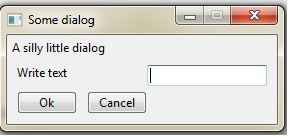IUP
- Cross platform native GUI toolkit.
- Supports declarative way of GUI definition.

IUP Dialog
require "iuplua"
require "iupluacontrols"
local label
local text = ""
local function onText(self)
text = string.upper(self.value)
end
local function modifyLabel(self)
if label then
label.title = text
end
end
dlg = iup.dialog
{
iup.vbox
{
iup.label{title = 'A silly little dialog', map_cb = function(self) label = self end},
iup.vbox
{
iup.hbox
{
iup.label{title='Write text', size="80"},
iup.text{size="80", valuechanged_cb = onText}
;margin="0", gap="10"
};
iup.hbox
{
iup.button{title="Ok",size="40", action = modifyLabel},
iup.button{title="Cancel",size="40" , action = function () return iup.CLOSE end}
;margin="0", gap="10"
};
}
;margin="5x5", gap="5"
}
;title="Some dialog", resize="NO"
}
dlg:popup()
Comments